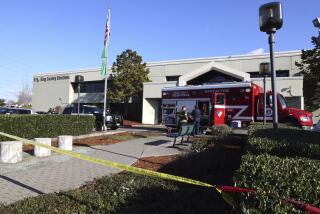Worried Businesses Handle Mail With Care
- Share via
WASHINGTON — Around the country, businesses that have depended on the mail to advertise their wares, deliver their products and collect their payments have suddenly begun treating it as a threat.
In sometimes ineffective efforts to avoid exposure to anthrax, they are microwaving their mail, handling it with protective clothing or turning it over to companies that specialize in running other companies’ mail rooms.
In some places, mail rooms look like the clean rooms at nuclear power plants. Workers wearing plastic suits unload parcels in sealed rooms.
“We are all feeling a little anxious and proceeding with due caution and taking any practical steps to protect ourselves, our customers and our business partners,” said Richard Hallabrin, spokesman for Mail Boxes Etc., a San Diego-based franchiser of 4,200 mail shipping and packaging outlets.
At the Mail Boxes Etc. branch in College Park, Md., owner Velue Sabapathy and his employees have responded to the anthrax scare by wearing masks and rubber gloves as they sort mail for customers.
The Washington Post sequesters mail addressed to the newsroom in a new emergency mail room with a special exhaust system to draw any spores out of the building, reporters said. Staff members are under instructions to wear masks and gloves when collecting their mail and to open all their mail inside the room.
In Los Angeles, a few executives of the Lakers basketball organization have taken to cooking some incoming mail in a microwave oven--a precaution that probably doesn’t help, experts say. Some pieces of mail have ended up in flames.
With the holiday shopping season approaching, the perceived safety of the mail is of tremendous economic importance. The nearly $900 billion in revenue generated by the U.S. Postal Service and private mailing services accounts for about 9% of the nation’s economy, according to the Mail Industry Task Force.
If the anthrax scare proves temporary, business’ precautions may also be. And many companies, particularly those not on the East Coast, are still moving tentatively. But while government officials are pondering what the appropriately measured response is for the nation, many companies have leaped to the next stage.
Some of the precautions being taken to try to avert an anthrax infection may not work against a bacterium that has killed two postal workers in Washington and a photo editor at American Media Publishing in Boca Raton, Fla.
Experts say surgical masks may be too porous to keep out high-grade anthrax. And Melvin First, a professor emeritus of environmental health at Harvard University, says anthrax spores must be subjected to at least 400-degree heat for an hour to kill them--a heavy load for a typical kitchen microwave oven.
But even though microwaving might not work, an aide to a Lakers’ executive said, “it gives certain people peace of mind.”
Although the feared bacterium has many companies on the defensive, it may be breathing new life into the beleaguered technology industry.
Experts predict the anthrax scare may revive at least some parts of the industry by accelerating the shift away from regular mail to e-mail and from printed catalogs and brochures to online advertising.
International Data Corp., a Framingham, Mass., research firm, predicts e-mail use will more than double within four years to 16 billion messages a day worldwide, though it holds the anthrax scare responsible for only a fraction of that increase.
“These events, tragic as they have been, will be a huge catalyst for electronic bill paying,” said Richard P. Nespola, president of Management Network Group Inc., an Overland Park, Kan., consulting firm.
“I think we will see rapid change in the way people do business.”
Marketers May Change Junk Mailings
Change is already in evidence at Lands’ End, a Dodgeville, Wis., mail-order firm. Since Oct. 13, the apparel firm has been quarantining incoming mail in a special room, where it can be examined by a group of specially clothed and trained employees.
The company’s new vigilance produced a scare a few days ago when mail room workers discovered a package leaking a white, powdery substance.
Authorities who were called in to investigate determined that the powder consisted of silica granules used to keep the contents of the package dry, said company spokeswoman Beverly Holmes.
To avoid alarming consumers with similar mysteries, junk mailers and other marketers--which once went to great pains to personalize their mass mailings--may become more forthcoming about the companies behind the campaigns.
“Companies are going to have to be more obvious as to who they are . . . in order to get [consumers] to open the envelope,” William Davis, chairman of commercial printing firm R.R. Donnelley & Sons Co. in Chicago, told investment analysts Wednesday.
Some companies are taking comfort in the fact that few anthrax scares have reached the West Coast.
“We are exercising caution, but as we are more West Coast based than East Coast, we haven’t directly experienced these issues, and we are pleased about that,” said Michael Collins, a spokesman for Recreational Equipment Inc. in Kent, Wash.
Those on the East Coast are much more worried.
“There have been lots of scares . . . and fears about everything, including anthrax,” said Laurel Toby, chief executive of Media Bistro, a New York City-based firm that promotes media industry job postings and networking.
“I’ve had to take the strong approach with my employees and talk them through a worst-case scenario. I ask them: ‘How likely is it that a piece of mail or your subway car is going to have anthrax in it? And if you are infected, you’ll take antibiotics and you’ll be fine.’ ”
Yet concern is widespread enough that the once-sleepy mail-outsourcing business is showing new signs of vigor.
“We have had a 40 to 50% increase in inquiries over the last week,” said Mitchell Weiner, president of Archer Management Services, which manages more than 700 mail rooms around the country.
Company Taking ‘Prudent Measures’
Pitney Bowes Corp. of Stamford, Conn., reports that it too has received more queries about mail room outsourcing.
Though Bowes operates 1,300 mail-sorting facilities that process thousands of pieces of mail a day, the company has not tested or medicated any of its workers for anthrax, said company spokeswoman Sheryl Y. Battles.
“We are taking the prudent measures suggested by the Postal Service, [but] other than that, we are not doing anything special,” Battles said. “We are just looking at things on a case-by-case basis.”
*
Times researchers Edith Stanley in Atlanta and Lynn Marshall in Seattle contributed to this report.
More to Read
Inside the business of entertainment
The Wide Shot brings you news, analysis and insights on everything from streaming wars to production — and what it all means for the future.
You may occasionally receive promotional content from the Los Angeles Times.











